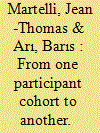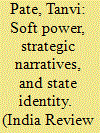|
|
|
Sort Order |
|
|
|
Items / Page
|
|
|
|
|
|
|
| Srl | Item |
| 1 |
ID:
160687


|
|
|
|
|
| Summary/Abstract |
Several recent studies propose that political choices of Indian youth can hardly be distinguished from those of their parents in many respects. Contrary to this well-established understanding, this article shows that when set apart from the spheres of family and work, students in a flagship Indian university—mostly in the social sciences and humanities—gradually transform their political attitudes in light of prolonged exposure to a campus environment. Through combining ethnographic study with the analysis of a survey of political attitudes of Jawaharlal Nehru University (JNU) students, we show that time spent in situ fosters participation to political activities, increases chances of joining a student organization and make students more likely to identify themselves as politically radical. The class and caste background of students, on the other hand, are not strongly associated with political attitudes, showing the integrative nature of politicization on the JNU campus.
|
|
|
|
|
|
|
|
|
|
|
|
|
|
|
|
| 2 |
ID:
160688


|
|
|
|
|
| Summary/Abstract |
Sanitation policies in India have primarily focused on infrastructure development, through building latrines and toilets. Given the persistence of open defecation in India despite such efforts, emphases on behavioral change interventions are crucial. We explore why and how the dual nature of purity and degradation in public and private spaces is relevant to such problems. In the context of sanitation and health policies in India, we propose an intervention that exploits social norms associated with purity via the use of religious imagery in public spaces as a deterrent for unhygienic sanitation behaviors. This intervention falls within the framework of nudging, which has received great emphasis in recent policy discussions. In the absence of empirical data on the intervention, this paper takes into account considerations of ethics, implications, cost, and scalability; suggestions on implementing the intervention at various levels of government are provided keeping in mind India’s socio-cultural context.
|
|
|
|
|
|
|
|
|
|
|
|
|
|
|
|
| 3 |
ID:
160689


|
|
|
|
|
| Summary/Abstract |
In 2011, India and Afghanistan signed the Strategic Partnership Agreement that delimited cooperation in economic, social, political, and cultural areas. It depicted the rise of Indian soft power influence. However, the extent to which India garners strategic influence in Afghanistan through soft power remains contentious. This article contends that India’s soft power effectiveness in Afghanistan post-2011 can be fully grasped only via the construction and reception of India’s regional power identity negotiated at the sites of: “civilization,” “democracy,” and “economic-military” enabling India to provide a regional leadership that can forward both India and Afghanistan’s mutual interests. Examining soft power via the constructivist-discursive framework of collective identity strategic narrative, this article compares India-Afghanistan relations in periods 2011–14 and 2014–17. The former formalized strategic partnership agreement and the latter marked continuation of the agreement albeit through domestic political transitions in both countries. This article demonstrates that the Indian soft power influence in Afghanistan between 2014 and 2017 has increased markedly.
|
|
|
|
|
|
|
|
|
|
|
|
|
|
|
|
|
|
|
|
|